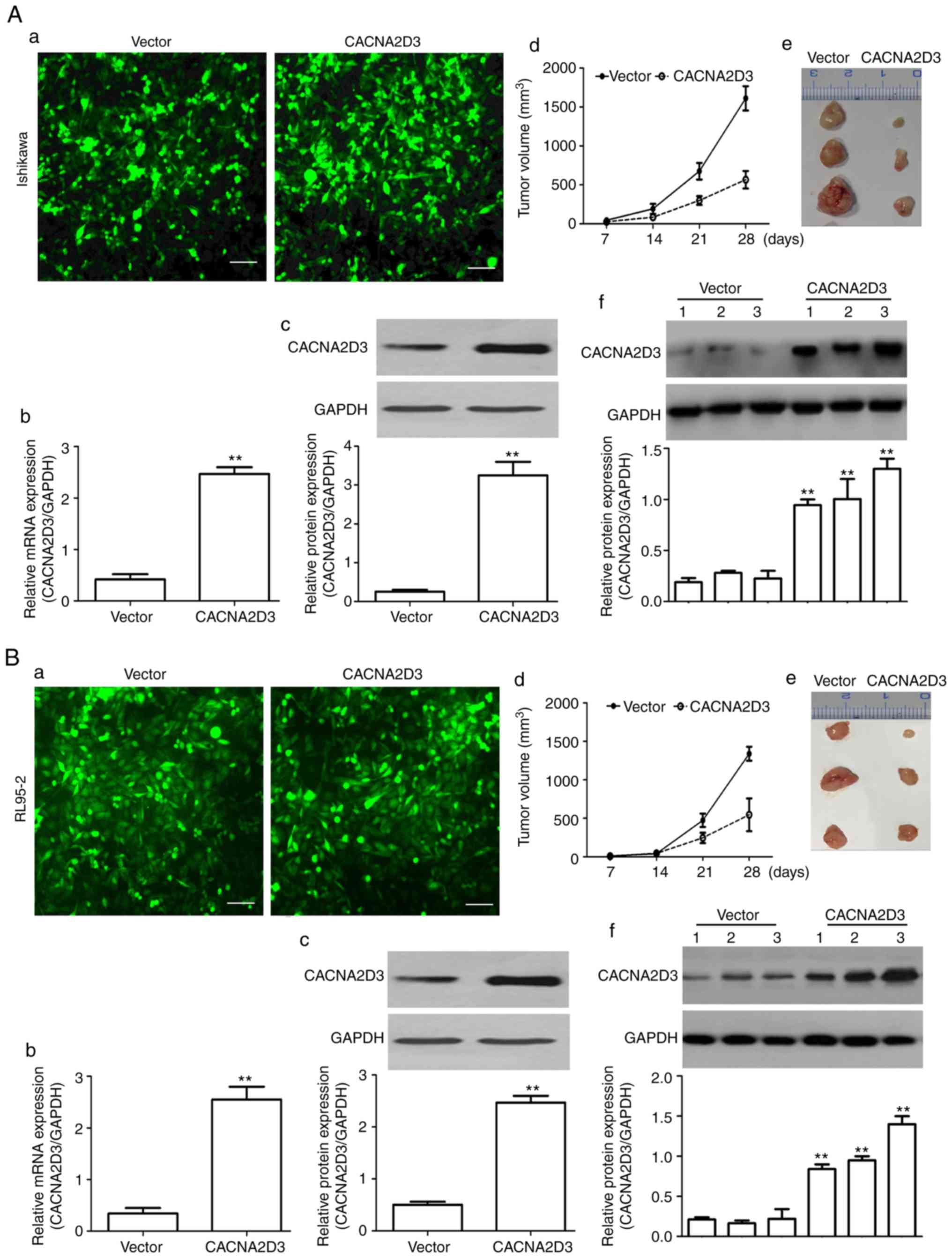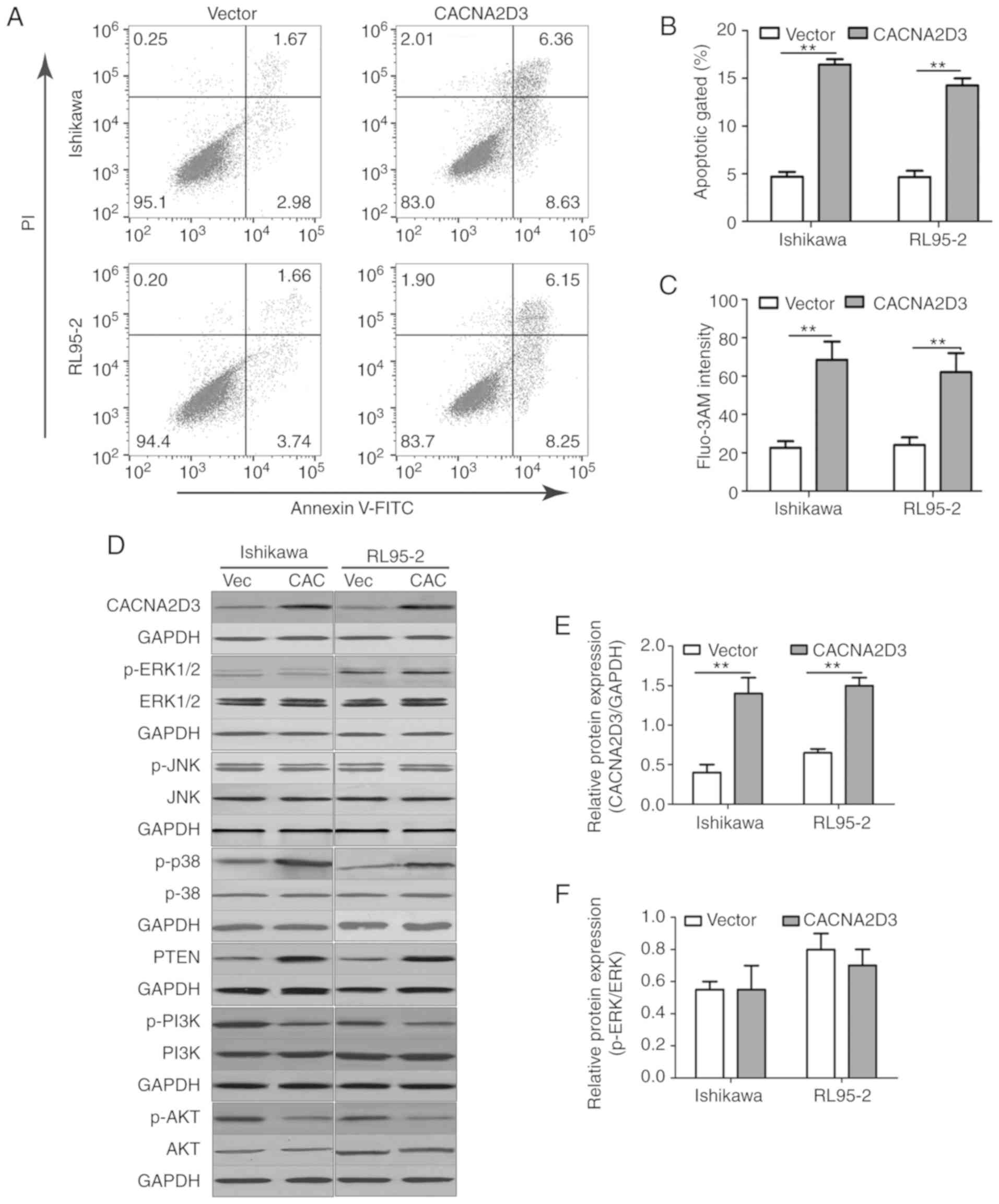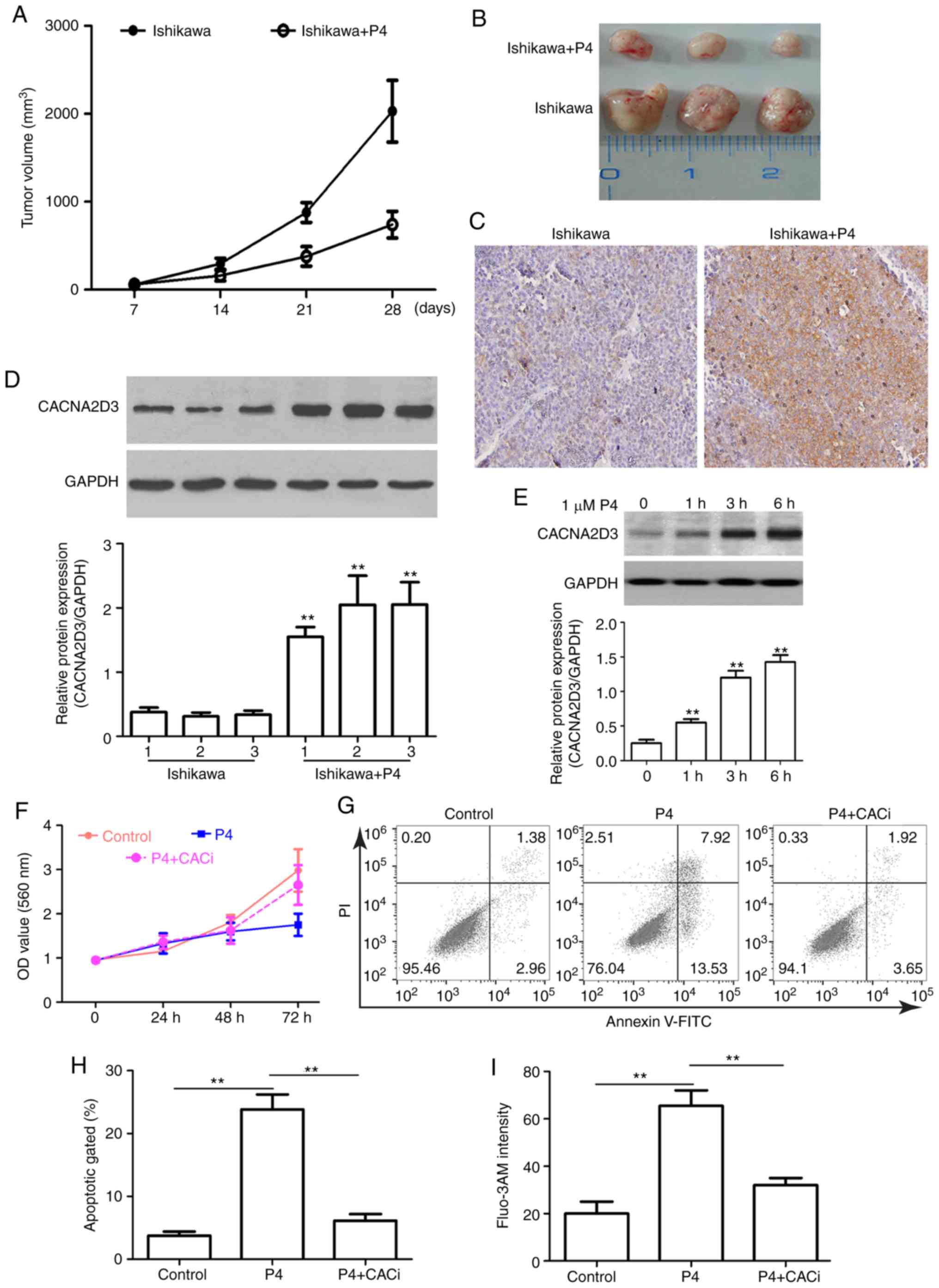|
1
|
Amant F, Moerman P, Neven P, Timmerman D,
Van Limbergen E and Vergote I: Endometrial cancer. Lancet.
366:491–505. 2005. View Article : Google Scholar : PubMed/NCBI
|
|
2
|
Su Y, Wang J, Ma Z, Gong W and Yu L:
miR-142 suppresses endometrial cancer proliferation in vitro and in
vivo by targeting cyclin D1. DNA Cell Biol. 38:144–150. 2019.
View Article : Google Scholar : PubMed/NCBI
|
|
3
|
Teng F, Tian WY, Wang YM, Zhang YF, Guo F,
Zhao J, Gao C and Xue FX: Cancer-associated fibroblasts promote the
progression of endometrial cancer via the SDF-1/CXCR4 axis. J
Hematol Oncol. 9:82016. View Article : Google Scholar : PubMed/NCBI
|
|
4
|
Liu B, Che Q, Qiu H, Bao W, Chen X, Lu W,
Li B and Wan X: Elevated MiR-222-3p promotes proliferation and
invasion of endometrial carcinoma via targeting ERα. PLoS One.
9:e875632014. View Article : Google Scholar : PubMed/NCBI
|
|
5
|
Jiang Y, Chen L, Taylor RN, Li C and Zhou
X: Physiological and pathological implications of retinoid action
in the endometrium. J Endocrinol. 236:R169–R188. 2018. View Article : Google Scholar : PubMed/NCBI
|
|
6
|
Chi S, Liu Y, Zhou X, Feng D, Xiao X, Li
W, Zhao Y and Wang H: Knockdown of long non-coding HOTAIR enhances
the sensitivity to progesterone in endometrial cancer by epigenetic
regulation of progesterone receptor isoform B. Cancer Chemother
Pharmacol. 83:277–287. 2019. View Article : Google Scholar : PubMed/NCBI
|
|
7
|
Adams NR and DeMayo FJ: The role of
steroid hormone receptors in the establishment of pregnancy in
rodents. Adv Anat Embryol Cell Biol. 216:27–49. 2015. View Article : Google Scholar : PubMed/NCBI
|
|
8
|
Park JY, Kim DY, Kim TJ, Kim JW, Kim JH,
Kim YM, Kim YT, Bae DS and Nam JH: Hormonal therapy for women with
stage IA endometrial cancer of all grades. Obstet Gynecol.
122:7–14. 2013. View Article : Google Scholar : PubMed/NCBI
|
|
9
|
Pirone A, Kurt S, Zuccotti A, Ruttiger L,
Pilz P, Brown DH, Franz C, Schweizer M, Rust MB, Rubsamen R, et al:
alpha2delta3 is essential for normal structure and function of
auditory nerve synapses and is a novel candidate for auditory
processing disorders. J Neurosci. 34:434–445. 2014. View Article : Google Scholar : PubMed/NCBI
|
|
10
|
Qin N, Yagel S, Momplaisir ML, Codd EE and
D'Andrea MR: Molecular cloning and characterization of the human
voltage-gated calcium channel alpha(2)delta-4 subunit. Mol
Pharmacol. 62:485–496. 2002. View Article : Google Scholar : PubMed/NCBI
|
|
11
|
Davies A, Hendrich J, Van Minh AT, Wratten
J, Douglas L and Dolphin AC: Functional biology of the
alpha(2)delta subunits of voltage-gated calcium channels. Trends
Pharmacol Sci. 28:220–228. 2007. View Article : Google Scholar : PubMed/NCBI
|
|
12
|
Qin YR, Fu L, Sham PC, Kwong DL, Zhu CL,
Chu KK, Li Y and Guan XY: Single-nucleotide polymorphism-mass array
reveals commonly deleted regions at 3p22 and 3p14.2 associate with
poor clinical outcome in esophageal squamous cell carcinoma. Int J
Cancer. 123:826–830. 2008. View Article : Google Scholar : PubMed/NCBI
|
|
13
|
Tai AL, Mak W, Ng PK, Chua DT, Ng MY, Fu
L, Chu KK, Fang Y, Qiang Song Y, Chen M, et al: High-throughput
loss-of-heterozygosity study of chromosome 3p in lung cancer using
single-nucleotide polymorphism markers. Cancer Res. 66:4133–4138.
2006. View Article : Google Scholar : PubMed/NCBI
|
|
14
|
Hanke S, Bugert P, Chudek J and Kovacs G:
Cloning a calcium channel alpha2delta-3 subunit gene from a
putative tumor suppressor gene region at chromosome 3p21.1 in
conventional renal cell carcinoma. Gene. 264:69–75. 2001.
View Article : Google Scholar : PubMed/NCBI
|
|
15
|
De Preter K, Vandesompele J, Heimann P,
Yigit N, Beckman S, Schramm A, Eggert A, Stallings RL, Benoit Y,
Renard M, et al: Human fetal neuroblast and neuroblastoma
transcriptome analysis confirms neuroblast origin and highlights
neuroblastoma candidate genes. Genome Biol. 7:R842006. View Article : Google Scholar : PubMed/NCBI
|
|
16
|
Nie C, Qin X, Li X, Tian B, Zhao Y, Jin Y,
Li Y, Wang Q, Zeng D, Hong A and Chen X: CACNA2D3 enhances the
chemosensitivity of esophageal squamous cell carcinoma to cisplatin
via inducing ca2+-mediated apoptosis and suppressing
PI3K/Akt pathways. Front Oncol. 9:1852019. View Article : Google Scholar : PubMed/NCBI
|
|
17
|
Palmieri C, Rudraraju B, Monteverde M,
Lattanzio L, Gojis O, Brizio R, Garrone O, Merlano M, Syed N, Lo
Nigro C and Crook T: Methylation of the calcium channel regulatory
subunit alpha2delta-3 (CACNA2D3) predicts site-specific relapse in
oestrogen receptor-positive primary breast carcinomas. Br J Cancer.
107:375–381. 2012. View Article : Google Scholar : PubMed/NCBI
|
|
18
|
Wong AM, Kong KL, Chen L, Liu M, Zhu C,
Tsang JW and Guan XY: Characterization of CACNA2D3 as a putative
tumor suppressor gene in the development and progression of
nasopharyngeal carcinoma. Int J Cancer. 133:2284–2295. 2013.
View Article : Google Scholar : PubMed/NCBI
|
|
19
|
Jin Y, Cui D, Ren J, Wang K, Zeng T and
Gao L: CACNA2D3 is downregulated in gliomas and functions as a
tumor suppressor. Mol Carcinog. 56:945–959. 2017. View Article : Google Scholar : PubMed/NCBI
|
|
20
|
Livak KJ and Schmittgen TD: Analysis of
relative gene expression data using real-time quantitative PCR and
the 2(-Delta Delta C(T)) method. Methods. 25:402–408. 2001.
View Article : Google Scholar : PubMed/NCBI
|
|
21
|
Davies C, Pan H, Godwin J, Gray R,
Arriagada R, Raina V, Abraham M, Medeiros Alencar VH, Badran A,
Bonfill X, et al: Long-term effects of continuing adjuvant
tamoxifen to 10 years versus stopping at 5 years after diagnosis of
oestrogen receptor-positive breast cancer: ATLAS, a randomised
trial. Lancet. 381:805–816. 2013. View Article : Google Scholar : PubMed/NCBI
|
|
22
|
Pfeiffer RM, Park Y, Kreimer AR, Lacey JV
Jr, Pee D, Greenlee RT, Buys SS, Hollenbeck A, Rosner B, Gail MH
and Hartge P: Risk prediction for breast, endometrial, and ovarian
cancer in white women aged 50 y or older: Derivation and validation
from population-based cohort studies. PLoS Med. 10:e10014922013.
View Article : Google Scholar : PubMed/NCBI
|
|
23
|
Cheng M, Michalski S and Kommagani R: Role
for growth regulation by estrogen in breast cancer 1 (GREB1) in
hormone-dependent cancers. Int J Mol Sci. 19:E25432018. View Article : Google Scholar : PubMed/NCBI
|
|
24
|
Yuan DZ, Lei Y, Zhao D, Pan JL, Zhao YB,
Nie L, Liu M, Long Y, Zhang JH and Yue LM: Progesterone-induced
miR-145/miR-143 inhibits the proliferation of endometrial
epithelial cells. Reprod Sci. 26:233–243. 2019. View Article : Google Scholar : PubMed/NCBI
|
|
25
|
Wuertz K, Vo N, Kletsas D and Boos N:
Inflammatory and catabolic signalling in intervertebral discs: The
roles of NF-κB and MAP kinases. Eur Cell Mater. 23:103–120.
2012.PubMed/NCBI
|
|
26
|
Cook SJ and Lockyer PJ: Recent advances in
Ca(2+)-dependent Ras regulation and cell proliferation. Cell
Calcium. 39:101–112. 2006. View Article : Google Scholar : PubMed/NCBI
|
|
27
|
Song Z, Wang Y, Zhang F, Yao F and Sun C:
Calcium Signaling Pathways: Key Pathways in the Regulation of
Obesity. Int J Mol Sci. 20(pii): E27682019. View Article : Google Scholar : PubMed/NCBI
|
|
28
|
Wei Y, Jin Z, Zhang H, Piao S, Lu J and
Bai L: The transient receptor potential channel, vanilloid 5,
induces chondrocyte apoptosis via Ca2+ CaMKII-Dependent
MAPK and Akt/mTOR pathways in a rat osteoarthritis model. Cell
Physiol Biochem. 51:2309–2323. 2018. View Article : Google Scholar : PubMed/NCBI
|
|
29
|
Malloy KM, Wang J, Clark LH, Fang Z, Sun
W, Yin Y, Kong W, Zhou C and Bae-Jump VL: Novasoy and genistein
inhibit endometrial cancer cell proliferation through disruption of
the AKT/mTOR and MAPK signaling pathways. Am J Transl Res.
10:784–795. 2018.PubMed/NCBI
|
|
30
|
Choi J, Jo M, Lee E, Hwang S and Choi D:
Aberrant PTEN expression in response to progesterone reduces
endometriotic stromal cell apoptosis. Reproduction. 153:11–21.
2017. View Article : Google Scholar : PubMed/NCBI
|
|
31
|
Zhuo Z and Yu H: miR-205 inhibits cell
growth by targeting AKT-mTOR signaling in progesterone-resistant
endometrial cancer Ishikawa cells. Oncotarget. 8:28042–28051. 2017.
View Article : Google Scholar : PubMed/NCBI
|
|
32
|
Gao X, Qin T, Mao J, Zhang J, Fan S, Lu Y,
Sun Z, Zhang Q, Song B and Li L: PTENP1/miR-20a/PTEN axis
contributes to breast cancer progression by regulating PTEN via
PI3K/AKT pathway. J Exp Clin Cancer Res. 38:2562019. View Article : Google Scholar : PubMed/NCBI
|
|
33
|
Guzeloglu-Kayisli O, Kayisli UA, Al-Rejjal
R, Zheng W, Luleci G and Arici A: Regulation of PTEN (phosphatase
and tensin homolog deleted on chromosome 10) expression by
estradiol and progesterone in human endometrium. J Clin Endocrinol
Metab. 88:5017–5026. 2003. View Article : Google Scholar : PubMed/NCBI
|
|
34
|
Garg D, Ng SSM, Baig KM, Driggers P and
Segars J: Progesterone-mediated non-classical signaling. Trends
Endocrinol Metab. 28:656–668. 2017. View Article : Google Scholar : PubMed/NCBI
|




















